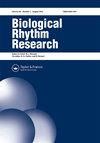波斯版卑尔根轮班工作睡眠问卷在护理中的信度和有效性
IF 0.9
4区 生物学
Q3 BIOLOGY
引用次数: 0
摘要
摘要本研究旨在评估波斯版卑尔根轮班工作睡眠问卷(BSWSQ)在伊朗护士中的有效性和可靠性。这项横断面研究采用简单的随机抽样方法对卡山的护士进行。BSWSQ的原文采用直接反向法翻译成波斯语。波斯语版的问卷是根据文化改编的。在收集问卷并打分后,使用探索性和验证性因素分析进行结构有效性。收敛有效性和发散有效性也进行了测试。Spearman相关系数、Cronbachα和ICC计算也用于测量可靠性。共有280人参与了这项研究,其中77.2%是女性。总BSWSQ的Cronbachα为0.83。类内相关性指数(ICC)计算为0.88(0.93–0.8),使用重测方法来估计工具的可靠性。探索性因素分析解释了75%的总方差。本研究表明,BSWSQ的波斯语翻译在评估伊朗人群中护士的睡眠方面具有良好的有效性和可靠性。该工具可以作为评估轮班员工睡眠质量的标准工具。本文章由计算机程序翻译,如有差异,请以英文原文为准。
Reliability and validity of Persian version of Bergen Shift Work Sleep Questionnaire in nursing
ABSTRACT This study aimed to evaluate the validity and reliability of the Persian version of the Bergen Shift Work Sleep Questionnaire (BSWSQ) in Iranian nurses. This cross-sectional study was performed on nurses in Kashan using simple random sampling. The original text of the BSWSQ was translated into Persian using the direct-reverse method. The Persian version of the questionnaire was culturally adapted performed. After collecting and scoring the questionnaires, the construct validity was performed using exploratory and confirmatory factor analysis. Convergent and divergent validity were also performed. Spearman correlation coefficient, Cronbach’s alpha, and ICC calculation were also used to measure reliability. A total of 280 people participated in this study, of which 77.2% were female. Cronbach’s alpha of the total BSWSQ was 0.83. The intra-class correlation index (ICC) was calculated as 0.88 (0.93–0.8) using the test-retest method to estimate the reliability of the tools. Exploratory factor analysis explained 75% of the total variance. This study showed that the Persian translation of the BSWSQ has good validity and reliability for assessing nurses’ sleep in the Iranian population. This tool can be a standard tool for assessing sleep quality in employees with work shift rotations.
求助全文
通过发布文献求助,成功后即可免费获取论文全文。
去求助
来源期刊

Biological Rhythm Research
生物-生理学
CiteScore
3.00
自引率
9.10%
发文量
34
审稿时长
6-12 weeks
期刊介绍:
The principal aim of Biological Rhythm Research is to cover any aspect of research into the broad topic of biological rhythms. The area covered can range from studies at the genetic or molecular level to those of behavioural or clinical topics. It can also include ultradian, circadian, infradian or annual rhythms. In this way, the Editorial Board tries to stimulate interdisciplinary rhythm research. Such an aim reflects not only the similarity of the methods used in different fields of chronobiology, but also the fact that many influences that exert controlling or masking effects are common. Amongst the controlling factors, attention is paid to the effects of climate change on living organisms. So, papers dealing with biometeorological aspects can also be submitted.
The Journal publishes original scientific research papers, review papers, short notes on research in progress, book reviews and summaries of activities, symposia and congresses of national and international organizations dealing with rhythmic phenomena.
 求助内容:
求助内容: 应助结果提醒方式:
应助结果提醒方式:


